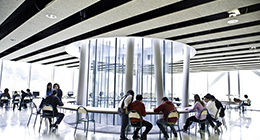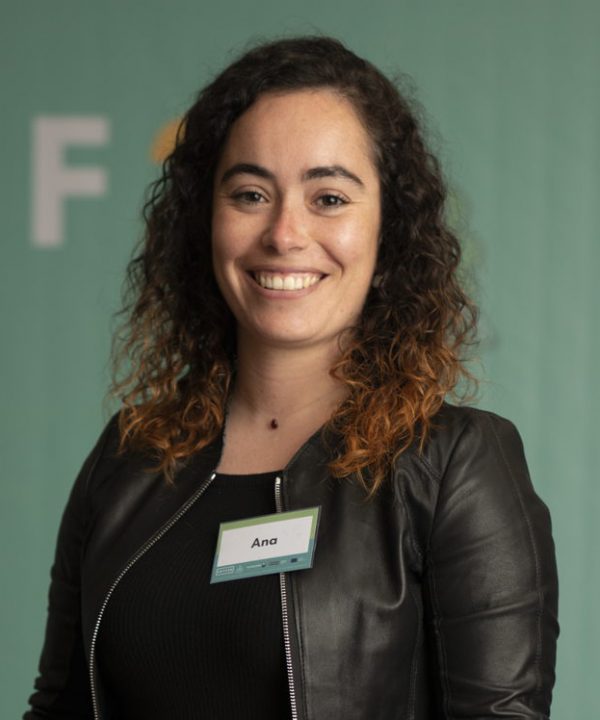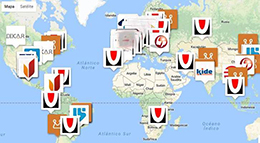To Πανεπιστήμιο του Mondragon δεν μοιάζει με όλα τα άλλα, διότι είναι συνεταιριστικό και εκπαιδεύει σε ένα συνεταιριστικό μοντέλο οικονομίας και επιχειρήσεων, ενώ πριν 6 χρόνια δημιούργησε το …πανεπιστήμιο που ταξιδεύει, το Traveling University!
Το Πανεπιστήμιο Mondragon είναι ένα συνεταιριστικό πανεπιστήμιο, που ιδρύθηκε το 1997 και αναγνωρίστηκε επίσημα βάσει του νόμου 4/1997 της 30ής Μαΐου, αν και αποτελείται από τρεις εκπαιδευτικούς συνεταιρισμούς (Mondragon Higher Polytechnic School S.Coop, Enpresagintza S.Coop και Teacher Training School S.Coop). Το 2011, ιδρύθηκε το Basque Culinary Center (το Βασκικό Κέντρο Γαστρονομίας) και και έγινε μέρος του Mondragon Unibertsitatea (Πανεπιστήμιο Mondragon).

Η δομή του Πανεπιστημίου Mondragon παρέχει μια ομπρέλα για ένα ισχυρό δίκτυο οργανισμών υποστήριξης, τα κυριότερα σημεία του οποίου είναι ειδικά για τον τομέα της Τεχνολογικής Έρευνας, IKERLAN, IDEKO και LORTEK – τρία διεθνώς αναγνωρισμένα Κέντρα Τεχνολογίας που αποτελούν πυρήνες της δομής του Πανεπιστημίου, SAIOLAN Επιχειρηματικό κέντρο και ALECOP.
ΝΟΜΙΚΗ ΣΥΝΕΤΑΙΡΙΣTIKH ΔΟΜΗ
Κάθε Σχολή με νομική συνεταιριστική δομή βασίζεται σε ένα κοινό έργο με κοινές αρχές συνεργασίας, όπως η προτεραιότητα του έργου και η συνεργασία, η δημοκρατία και η αλληλεγγύη
Αυτές οι αρχές ενισχύονται μέσω της εμπλοκής τριών συνεταιρισμών με ίση συμμετοχή:
- εργαζόμενοι εταίροι (ιδιοκτήτες του συνεταιρισμού με κεφάλαια περιουσιακού στοιχείου),
- συνεργαζόμενοι εταίροι (εκπρόσωποι συνεταιρισμών και μη συνεταιρισμών και άλλων ιδρυμάτων) και
- φοιτητές

Δημόσια χρήση, μη κερδοσκοπική και βιώσιμη, και εντός της Mondragon Corporation Ως πανεπιστήμιο με σαφή κοινωνική κατεύθυνση, επικεντρωμένο στην οικοδόμηση της σωστής εργασίας στην κοινωνία, το εκπαιδευτικό του μοντέλο και η μοναδική ερευνητική του προσέγγιση προσανατολίζονται στις ανάγκες της συνεταιριστικής επιχείρησης.
Με στόχο την δημιουργία μη κερδοσκοπικών συνεταιρισμών, το Πανεπιστήμιο προωθεί την οικονομική ικανότητα και την αυτοχρηματοδότηση των φοιτητών ώστε να έχουν την ευκαιρία να συνδυάσουν σπουδές και εργασία.
Ως μη-δημόσιος οργανισμός, οι συνεταιρισμοί έχουν ενσωματώσει την έννοια της βιωσιμότητας στις δικές τους δραστηριότητες, με τα θετικά αποτελέσματα του έτους να επενδύονται στον συνεταιρισμό και τα αρνητικά αποτελέσματα να τίθενται έναντι των περιουσιακών στοιχείων των εταίρων με κεφάλαια (εργαζόμενοι εταίροι -ιδιοκτήτες του συνεταιρισμού με κεφάλαια περιουσιακού στοιχείου).

Αποκέντρωση και αυτοδιοίκηση
Κάθε Σχολή έχει μια συνεταιριστική νομική δομή, και ανεξάρτητες αποφάσεις μπορούν να λαμβάνονται από εκείνους που εκπροσωπούνται στη Γενική Συνέλευση (BO) και το Διοικητικό Συμβούλιο (GB). Η καθημερινή λειτουργία του συνεταιρισμού προεδρεύεται από την Εκτελεστική Επιτροπή (BB), που αποτελείται από τον Διευθυντή Σχολής (Dean Faculty) και τα Μέλη της Ομάδας του. Το Διοικητικό Συμβούλιο είναι ένας οργανισμός με εποπτικό ρόλο στο οποίον υποβάλλονται μηνιαίες εκθέσεις από την Εκτελεστική Επιτροπή. Τόσο τα μέλη της Γενικής Συνέλευσης όσο και του Διοικητικού Συμβουλίου εκλέγονται δημοκρατικά.
Το Mondragon Unibertsitatea είναι ένας δευτεροβάθμιος συνεταιρισμός που λειτουργεί ως οργανισμός ομπρέλα για διαφορετικές Σχολές. Διαμορφώνει τις γενικές πολιτικές του Πανεπιστημίου, την στρατηγική κατεύθυνση και θεσμική εκπροσώπηση. Δημιουργεί επίσης ορισμένους μηχανισμούς αλληλεγγύης μεταξύ των πρωτοβάθμιων συνεταιρισμών. Στόχος του Πανεπιστημίου είναι η κάλυψη των αναγκών της κοινωνίας και των συνεταιρισμών. Τα πρότυπα εργασίας και το σύστημα μισθών είναι “παρόμοια” με αυτά στους άλλους συνεταιρισμούς της MONDRAGON Corporation όσον αφορά τις ημέρες εργασίας, τους μισθούς, τις ώρες εργασίας. Το Πανεπιστήμιο δεσμεύεται για προσαρμογή στις τεχνολογικές και τις οικονομικές αλλαγές που προσδιορίζονται στη σφαίρα επιρροής των συνεταιρισμών.
© 2018 MONDRAGON UNIBERTSITATEA, Loramendi, 4. Post office box 23 – 20500 Arrasate – Mondragón – Spain
Tel.: +34 943 712 185 – Fax: +34 943 000 500, E-mail: info@mondragon.edu
———————————————————————————————————————————————————————————–
Mondragon and the Travelling University
Mondragon University is a cooperative university, founded in 1997 and officially recognised under Act 4/1997 of 30 May, albeit comprised of three educational cooperatives (Mondragon Higher Polytechnic School S.Coop, Enpresagintza S.Coop and Teacher Training School S.Coop). In 2011, the Basque Culinary Center was created and became part of Mondragon University.
‘The companies that come out of the Travelling University are all conscious of their impact on the world, and they want to make a difference.
In the 1940s, Spain was still suffering from the aftermath of the Civil War. Hunger, tensions and unemployment were high; morale was low. For Father José María Arizmendiarrieta ‘Arizmendi’ Madariaga, a Basque Catholic priest, one obvious solution was to encourage jobs through co-operatives, putting the Basque tradition of self-help at the centre of economic development. But for that, there first needed to be training.
Arizmendi, who arrived in the small town of Mondragón (Basque: Arrasate) in 1941, is best known for founding the beginnings of the Mondragón Corporation there in 1956. Today Mondragón is the largest business in the Basque Country (Spain), the seventh largest in Spain and often cited as the largest worker co-operative in the world. But the business itself came out of another of his projects; in 1943, Arizmendi had set up a polytechnic school, which became a training ground for managers, engineers and other skilled labour for local organisations – including co-operatives.
In the 1970s, the school joined with two other educational co-operatives (ETEO S. Coop and Irakasle Eskola S. Coop) to set up a non-profit co-operative university that was “close to the needs of businesses”. Mondragon University (Basque: Mondragon Unibertsitatea, MU) was officially recognised by the Basque Parliament on 30 May 1997.
The university has a participatory model and a stated public commitment towards “the social transformation of society through the comprehensive education of persons and the generation and transfer of knowledge”.
“We are a co-operative university,” it says, “with a clear human vocation and a commitment to our environment, our society and our time”.
Today, MU has students working on undergraduate, postgraduate and vocational courses across four faculties: engineering; business studies; humanities and education; and gastronomic sciences. MU is also home to Mondragon Team Academy (MTA) – an international community of team entrepreneurs learning by doing, co-creating a global network of social innovation ecosystem labs. Advertisement
MTA was created in May 2008 in close co-operation with TiimiAkatemia, as the innovation and entrepreneurship unit of the MU Business School. Its mission was to create an international community of young ‘teampreneurs’, multicultural leaders and changemakers with a global mindset and local commitment, who were rooted in strong values of co-creation, teamwork, solidarity and co-operation.
At MTA, students are put into teams and given the tools and opportunities to set up their own ventures. They take responsibility for their own participation. There is peer accountability throughout: you only succeed if your teammates do as well.
One business which came out of the first cohort of MTA students is Tazebaez (meaning ‘And why not?’ in Basque), an innovation team that “designs products, services, brands, environments, organizations and teams”. One of the co-founders, who went through the MTA programme is Ana Aguirre, who is also vice-president (Europe) of the International Cooperative Alliance’s Youth Network. “We learned co-op entrepreneurship in action,” she says. “Students generate their own team company in their first year – it’s a real company that needs to make money and pay taxes.”

At the start of the programme students are assigned to a team who they will work with for the full four years – this will be around 15 people with different skills and personalities (doers, thinkers, starters, finishers) – and together they learn how to run a business. In the fourth year the team decides if they want to dissolve the business or continue with it. Due to legal frameworks in the Basque country, these early businesses are initially set up as nonprofit associations.
Ms Aguirre’s team set up Tazebaez in 2009; after graduation, seven of the team continued with the business and turned it into a co-operative. Today Tazebaez has nearly 40 colleagues across five countries.
“We were the first generation of MTA,” she says. “At that time, it was very local – it’s part of Mondragon University, which has a very strong Basque identity. We travelled out and visited other countries, but Mondragon was our base. So, when we graduated we said to MU ‘look, this is very cool, but if we really want to generate global mindsets and global companies, we need to incorporate new cultures and foster cultural empathy within the teams rather than just going abroad.’”
Tazebaez put a proposal to MU for an itinerant programme, where teams are multicultural to start with – and then travel round the world to spend time in different countries. MU agreed that Tazebaez would manage the programme and they would stamp the degree.
“So five years ago we launched the Traveling University as an itinerant degree of entrepreneurship,” says Ms Aguirre. “We have five generations of students already running (one generation graduates this year because of delays caused by the pandemic). There are over 10 nationalities, various languages and a bunch of misunderstandings in culture level – and teampreneurs all around the world.”
Students spend months at a time living, learning and working together in locations such as Bilbao, Germany, Korea and Costa Rica (as well as China, India and the USA pre-pandemic), and they are looking at adding potential stops in Kenya, South Africa or the UK. In the first few months, they learn about the nature of co-operatives, and spend time with Mondragon Corporation. Other skills learned along the way are practical ones – such as maths, law, management, accounting, basic coding.
“The skills are learned because they need to be learned, not because someone has set up a random curriculum,” says Ms Aguirre. “For example, at the end one of the tests is that the financial director of the university will go through your business’s accounts. They need to be right, because they need to be submitted to the government.”
For her, this method of learning is important because students learn what self management and autonomy really mean. “And then you learn how to ask for help and how to be accountable to each other. You master the process of listening and understanding what your colleagues – empathy is a huge part. You travel worldwide so you understand cultures as well. And then you really look at the social impact.”
Ms Aguirre adds that learning together in this way generates people who know the power of saying or doing things together, the power of entrepreneurship and the power of democracy and ownership. “At the end, the students end up choosing to create companies that have value for the world. This is not mandatory. This is just what ends up happening but for us this is huge, because it shows that this way of learning generates empathy towards the world.
“We can say with pride that the companies that come out of the Traveling University are all conscious of their impact on the world, and they want to make a difference.”
Today the Travelling University offers two undergraduate degrees LEINN (Entrepreneurial Leadership and Innovation) International and LEINN Arts. Both are official European Bachelors degrees. Students don’t have classes, but open spaces. There are no teachers, but there are but Team Coaches. Learning is done through books, e-courses, LEINNers and mentors – but mainly through registering and working on real business projects students create in their teams – enriching multicultural processes of team entrepreneurship along the way.


Kαλημερα Νίκο
Χριστιανα Γαρδικιωτη εδω
Νεο Video https://www.youtube.com/watch?v=0HCibzEYCZI&t=5s&ab_channel=MerakiPeople
Θα ηθελα να συνεργαστουμε οι δυο φορείς Μeraki People και Ανεμος Ανανεωσης
για να φερουμε το Πανεπιστημιο του Μadragon στον Αγιαννη Κυνουριας
Τι λες ??μιλαμε στο zoom? Στειλε ωρα σε παρακαλω
να το δούμε μετά τις 15/8 Χριστίνα.